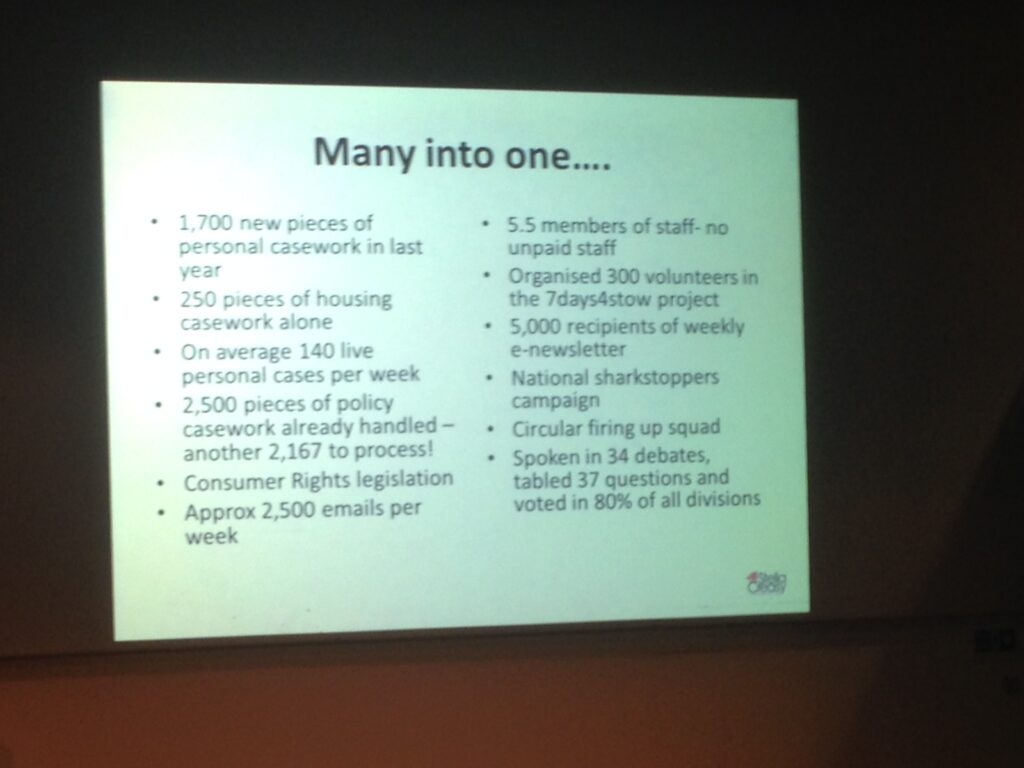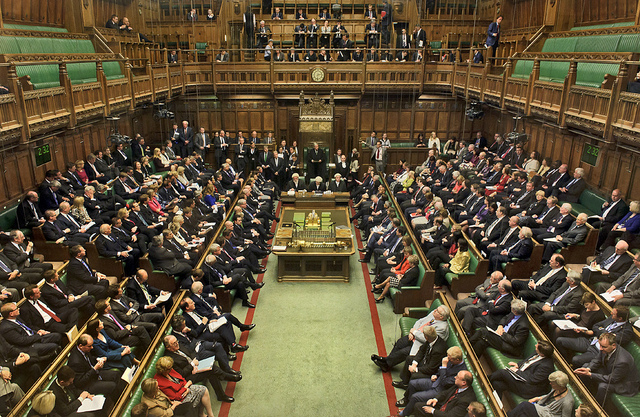It’s a truth, almost universally acknowledged, that MPs don’t like ‘email your MP’ petitions.Listen to MPs talk to campaigners, and they’ll tell you they find the annoying and a burden on precious staff time, but they’re a staple in most campaigning toolkits.
Most MPs will tell you that the volume of emails means it can be hard to distinguished between the signal and the noise? Don’t believe that? While this image is a little out of date (it’s from ECF2014) it was Stella Creasy sharing what, on average, comes into her inbox during a week in Parliament;

Now, I’m not suggesting that we should head calls from some MPs to stop petitioning them – they’re our elected officials so we should petition them. I’m also realistic that any ‘cross Parliament’ solution is unlikely to be adopted – MPs they say, have to be seen as 650 small businesses, so rarely do they all-adopt the same technology, unless they’re told to.
Plus I’m not going to dive into a debate about the quality of some campaigns, except to add that some email to MP campaigns don’t appear to have thought about what the theory of change is – and that has an impact all of us (all campaigners should read this on what makes an effective petition).
So what could replace them in our toolkit? Or if not replace improve how we use them?
1. Phone calls – Unlike the United States we don’t have much of a culture of calling your elected official – perhaps it’ll catch on? Even then it will still be likely to frustrate MPs as much as emails do as they don’t have the staff capacity to deal with the calls, or effective mechanisms to collect the information from them.
2. Parliament petition site – I’ve suggested before that the frustration of MPs could be channelled towards suggesting that they’ll only accept petitions via the official Parliament petition site. While the site has been improved, it still has lots of limitations – not least when it comes to supporter data which is held just by Parliament, that it’s a closed site (so it can’t be embedded on another website) and doesn’t allow for any personalisation by the signer.
3. Focus on a specific MP rather than all MPs – At the NCVO Campaigning Conference, Jess Phillips MP suggested that one of the most effective petitions she’d seen during her time in Parliament had been the change.org petition on the Tampon Tax, which had worked directly with Paula Sherriff MP to help to provide her with the evidence of support for the issue. Strikes me that most issues can find a Parliamentary champion or two, so perhaps this is a way forward?
4. Require your own message – MPs complain that too many emails are identikit, but while many of us try to persuade supporters to personalise the messages they send, have we tested what the drop off would be if we required supporters to come up with their own subject lines, or add in a reason why your signing? It wouldn’t solve the volume question, but could mean that MPs couldn’t accuse of us of just sending ‘identikit’ messages.
5. Better integration with casework software – many MPs who have large amounts of casework use software to track the requests that are coming in from constituents. How many of us are looking to see how we can incorporate our actions and messages into these?
6. Email to letter – Given I have an app on my phone that can turn my photos into a personalised postcard that can be sent in the post to a friend, could the same technology be developed to turn my email to an MP into a letter. It’d place a cost on the organisation behind the campaign, but it’d present the opportunity for delivery via another channel.
7. Snapchat – I can’t pretend to understand Snapchat – which probably means most MPs won’t either) but opportunities do new communication channels like Snapchat or WhatsApp provide new ways to communicate with MPs?
8. Bots – Florian from MoreOnion wonders here if the rise in the use of AI means that we’ll be able to design bots that will be able to automatically capture and engage in a campaign action – could that help MPs respond to our requests.
I’m sure other solutions exist , as well as examples of where petitions are having an impact – in the same presentations that I took that image from Stella Creasy talked about the importance of ensuring a petition is part of wider advocacy strategy – she specifically mentioned Friends of the Earth Bee campaign.
Either way what strikes me from the list above is that organisations have to be prepared to adapt and change rather than just defaulting to ’email your MP’. I look forward to hearing thoughts from others of how we make this tool work to have the maximum impact.
Email your MP – where next?

A email to letter solution exists at the moment called the Mr Postman app. It’s not a particularly nice app, but it does present some potential for trying that approach out.
I’m keen to see what we can to develop a solution to the email-your-mp problem, but there’s a prisoner’s dilemma – if we stop bombarding MPs, that makes the emails of others more visible. Without a solution that increases the impact for first-movers, it’s very hard to move away from that model.
A lot of solutions that are good for MPs aren’t necessarily good for impact. e.g. giving them a csv file with all the responses. Makes it easier for them to respond, but also easier to forget about.
Though nowadays we in general do fewer MP targeted actions anyway.
Thanks Ian, you beat me to it on Mr Postman.
Seems to me that the minimum campaigners should be aiming for is making sure that email to MP actions don’t ignore an MP’s public position on a subject. I often see actions asking me to contact my MP about stuff I know he’s actively campaigned on – I find this a bit embarrassing, but at least, since I know, I can edit the message. I can imagine it’s downright infuriating for MPs to receive an email exhorting them to care about an issue that they’ve been active on. This kind of message means there’s not even a pretence of an actual dialogue, and I don’t blame MPs for wanting to disengage.
I also get really annoyed by actions that ask me to email my MP about issues which are devolved to the Welsh Assembly, with suggested text that doesn’t acknowledge devolution in any way.